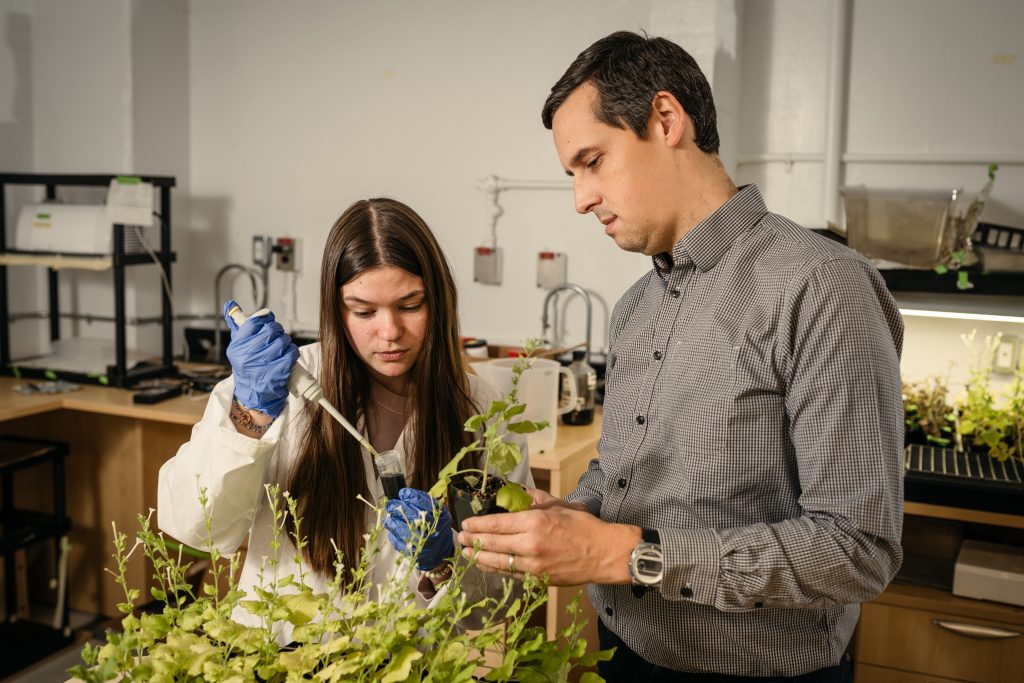Power plant: McMaster teams up with energy industry leaders to tackle sustainable agriculture

Todd Hoare's research group has partnered with Suncor to develop a soft chemical spray that will revolutionize the agriculture industry.
BY Naz Kittani and Jesse Dorey
February 8, 2023
Every year, crops across Canada are sprayed with pesticides, herbicides and fungicides to protect against harmful bacteria and infestations.
This annual tradition, however, poses a severe threat to our natural environments.
These harsh chemical sprays disturb natural ecosystems, contaminate soil and water and cause health problems in individuals who unknowingly consume them.
Beyond the damage done to both the environment and individuals alike, there are also logistical issues that need to be addressed.
For instance, it takes quite a bit of spray to get the chemicals to stick to the crops, which leads to an increased amount of spraying. And that’s not to mention the challenge to adhesion that naturally occurring events present, such as rain or morning dew.
That’s why McMaster researcher and chemical engineering professor Todd Hoare has teamed up with Suncor, a Canadian integrated energy company, to create a new type of “soft” chemical spray that allows plants to fight their own battles.
Hoping to revolutionize the way the agricultural industry cares for its crops, this partnership seeks to reduce the negative environmental impacts of harmful chemical sprays while promoting an approach that emphasizes sustainability and good health.
“Reducing the total amount of times we have to spray, reducing the total amount of materials we have to add, those are the things that are scientifically interesting in this area,” says Hoare. “We’re always interested in new technologies that use unique mode of actions or unique approaches to deal with problems that are commonly dealt with in other ways.”
GETTING TO THE ROOT OF THE PROBLEM
The spray is called a “soft” spray because it is made up of natural or less toxic chemicals than the current generation of chemical sprays.
Using photosensitizers – in plain terms, these are materials commonly found in cancer treatments that use sunlight to activate entities that kill bacteria – the spray works to make plants photosynthesize better to effectively fight off infections and pathogens on their own.
This novel approach offers crops long-lasting protection from harmful bacteria while simultaneously protecting the spray itself from rainwater and sunlight.
As a result, the new chemical spray has the potential to increase agricultural yields while reducing the amount of spray needed to protect crops.
In addition to this reduction in spray frequency, the spray’s durability also means that less of it needs to be produced to sustain crop yields.
To ensure that farmers can reduce the frequency of application, researchers must ensure that chemicals can be kept stable and break down at the correct rate while in storage.
Additionally, pathogens can present in plants in a variety of ways – on their surfaces, in their circulatory systems or in their cells. Because of this, explains Hoare, the spray must be designed in a way that allows the active components to reach the necessary area of the plant to treat a given infection.
“This is where McMaster Engineering’s nanomaterials expertise comes into play,” explains Hoare. “Our job is to get the active agent through the barriers presented by plants and keep it working.”
TURNING A NEW LEAF
The benefits of this new chemical spray go far beyond just increasing agricultural yields.
According to Hoare, this partnership represents a win for the environment, the agriculture industry and consumers.
On an environmental level, a reliance on a soft chemical spray, coupled with the reduced amount of spraying that will need to take place, will lead to a further reduction in the amount of harmful chemicals being released into the atmosphere and unknowingly ingested by us.
By incorporating students on the ground level and stressing the importance of in-person collaboration, Hoare hopes that this partnership will give students the ability to learn from globally recognized researchers and industry leaders alike.
“This collaboration is not just one between McMaster and Suncor, it is a collaboration between everyone involved in all stages of the projects we’re working on,” says Hoare. “It’s industry leaders supporting researchers, supporting students. Everyone plays a role in bettering one another and pushing the limits of what we can achieve with this partnership.”


